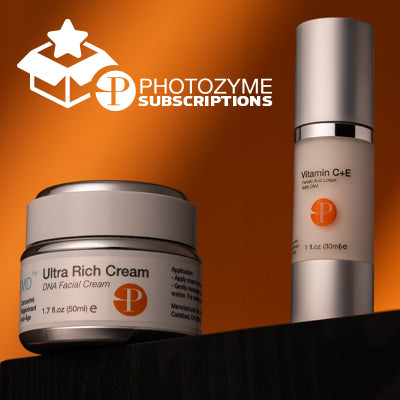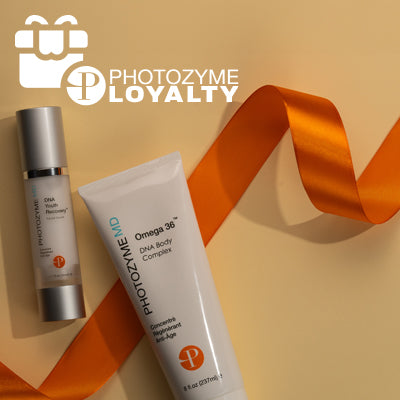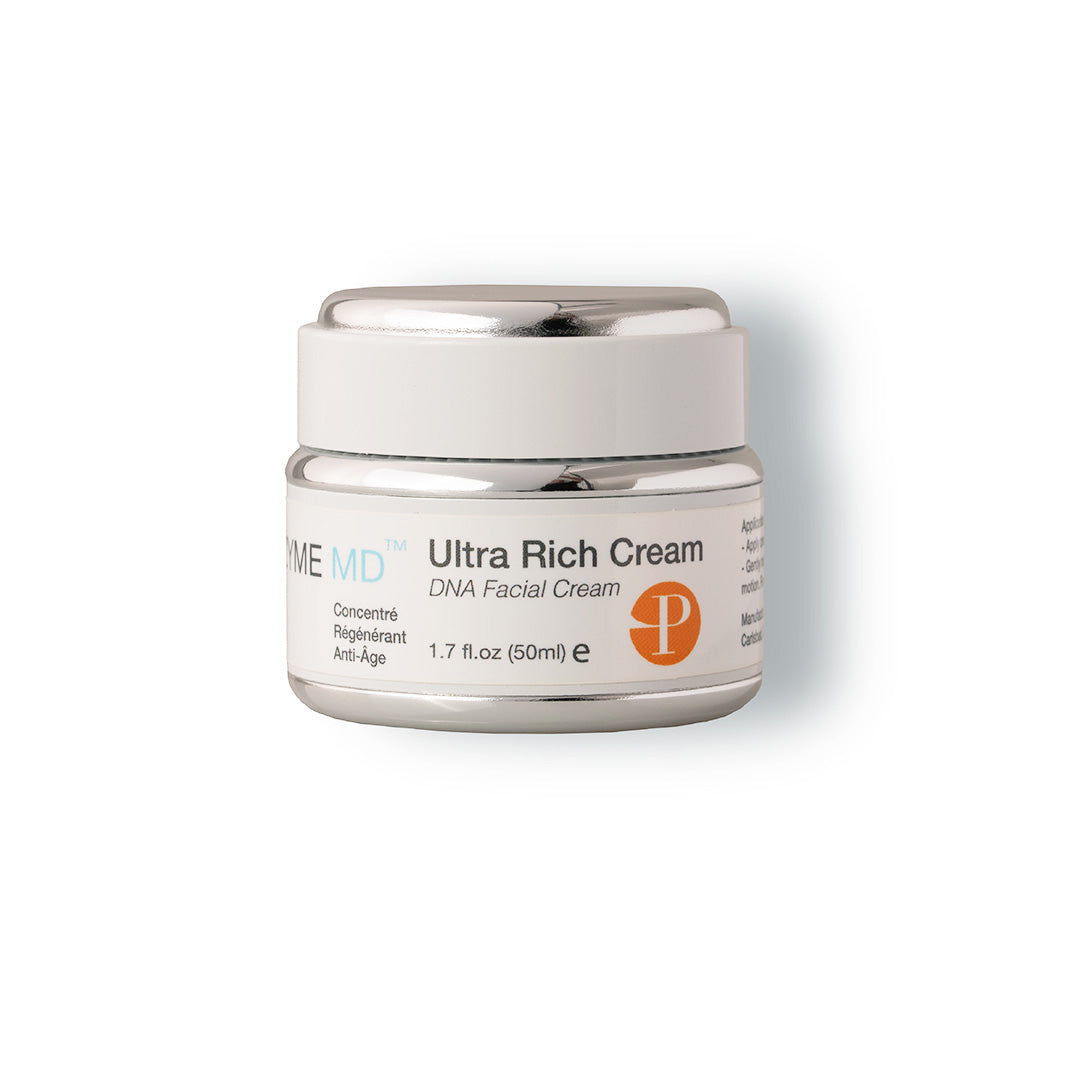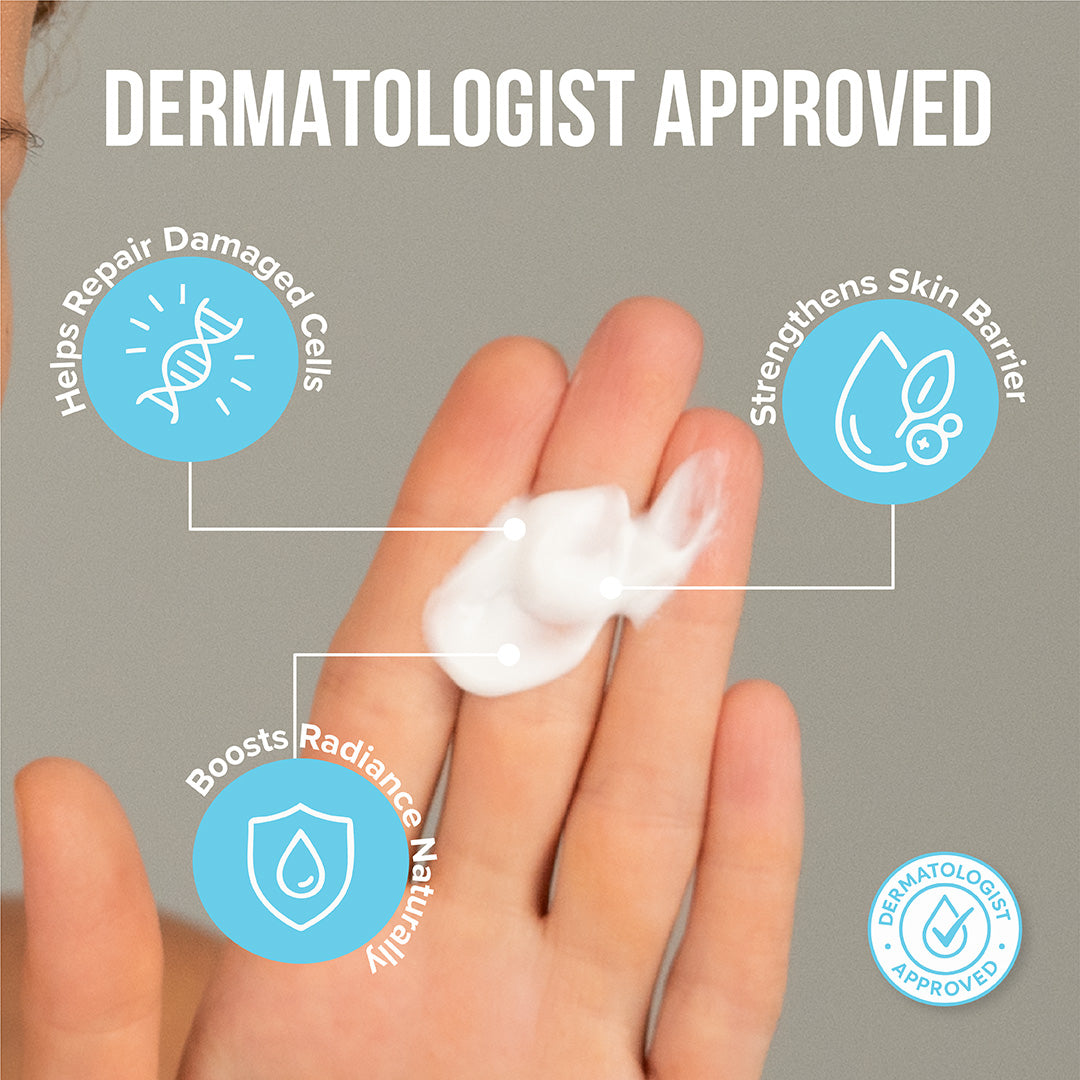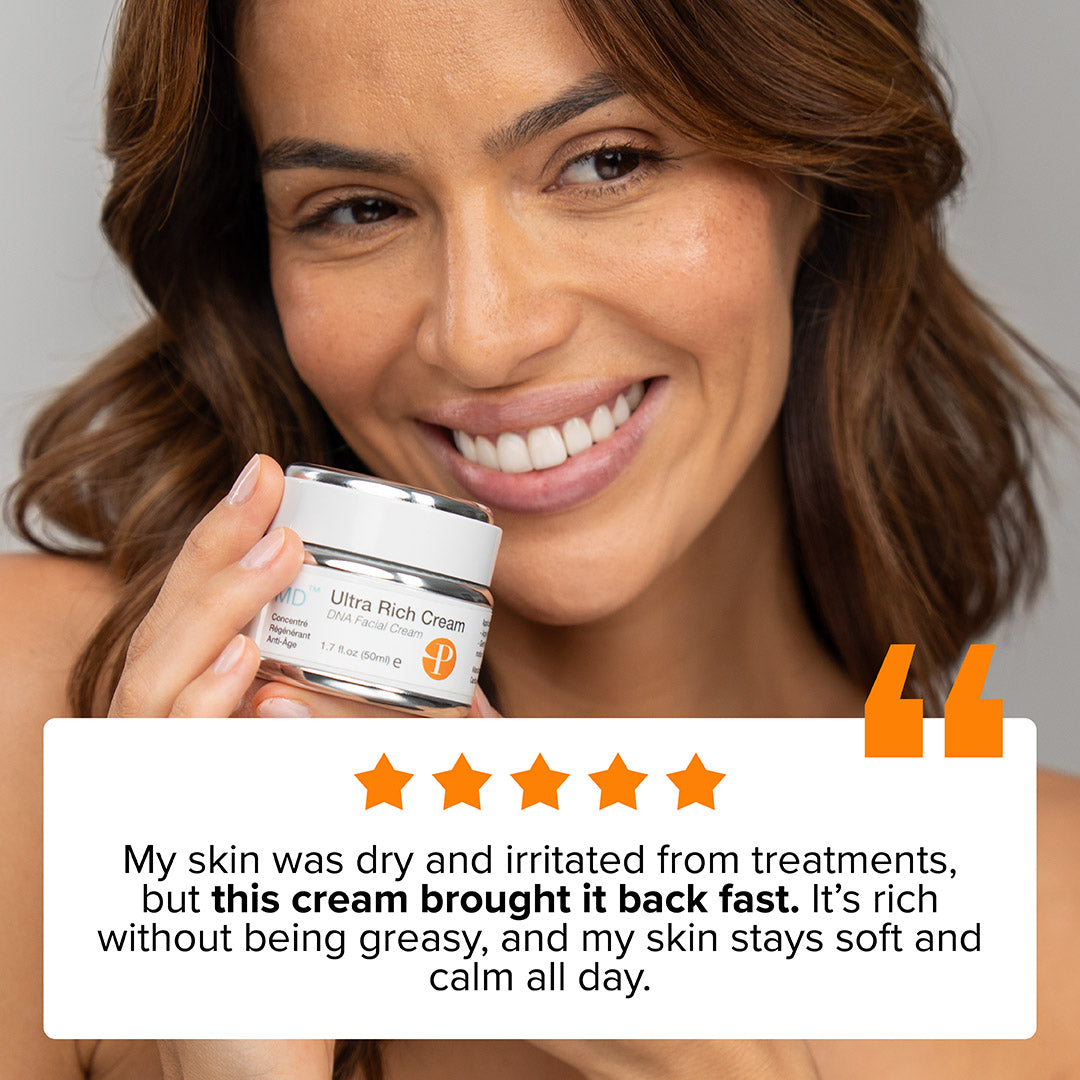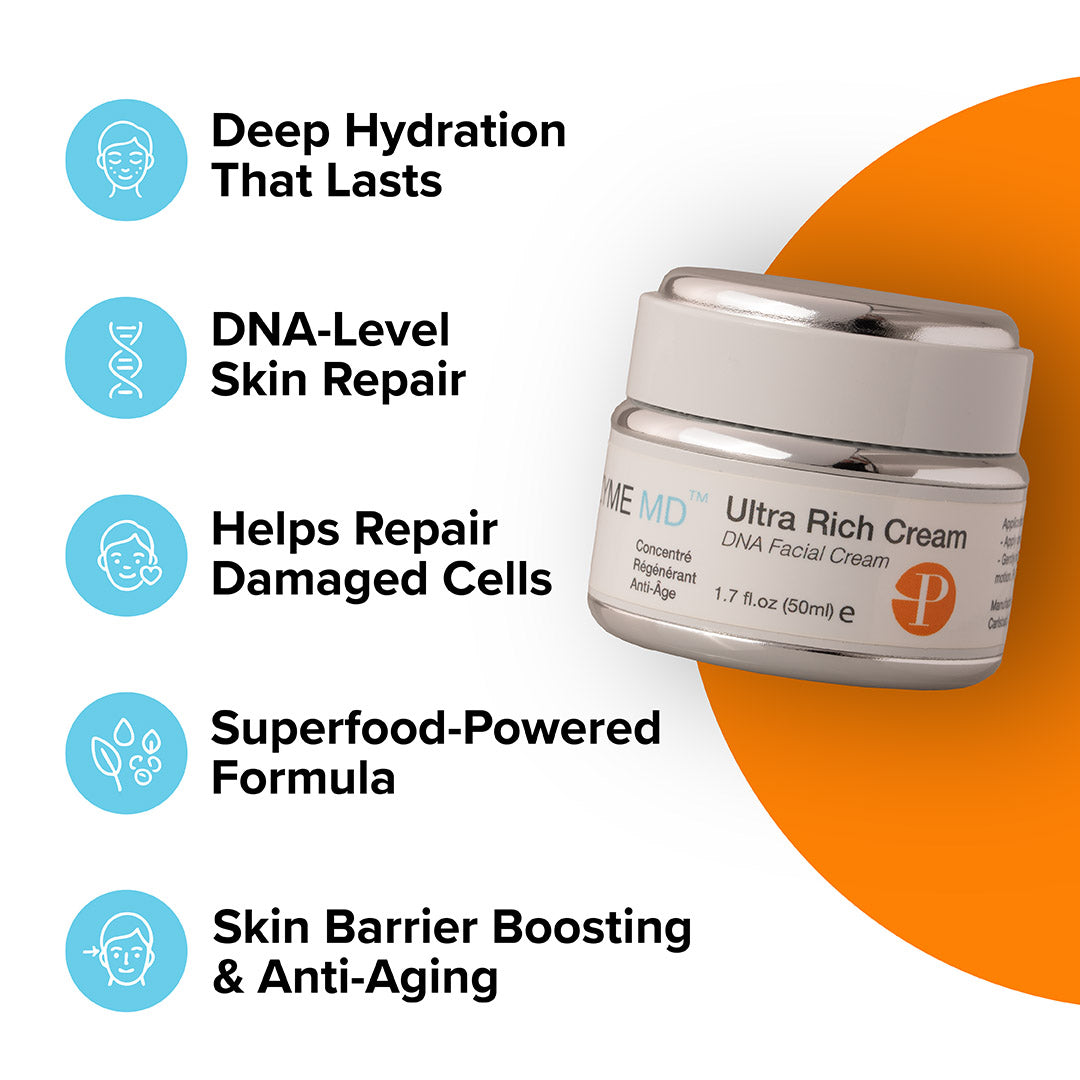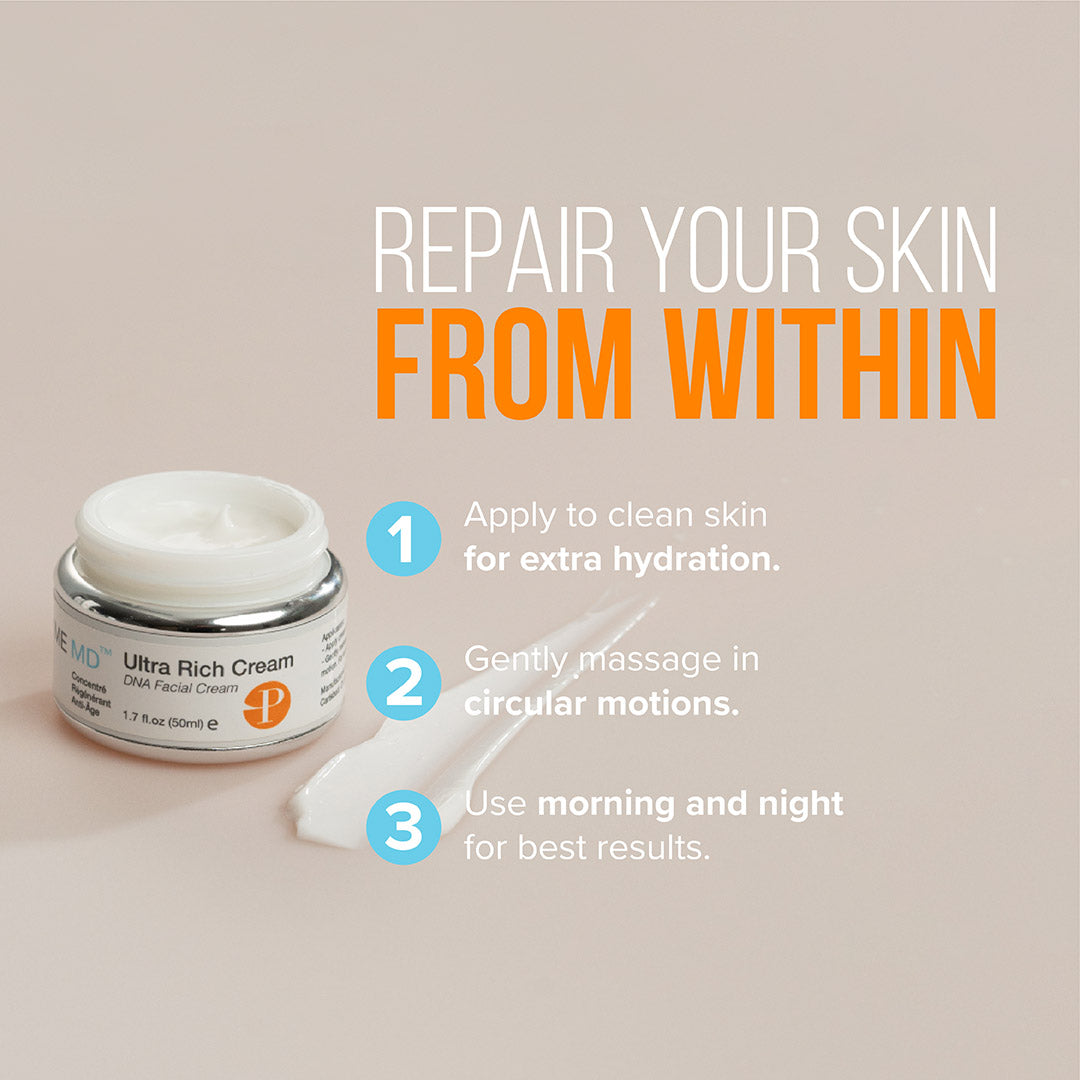This store requires javascript to be enabled for some features to work correctly.
Cream For Forehead Wrinkles
At Photozyme, we understand the complexity of facial aging and the specific concerns related to forehead wrinkles. Our dedication to pioneering advanced skincare solutions has led us to develop a cream uniquely formulated to combat these aging signs head-on. Leveraging our expertise in DNA repair and protection, our products stand out not only for their ability to diminish the appearance of existing wrinkles but also for their preventative properties against future lines and damage.
Ultra Rich DNA Facial Cream 1.7 fl oz
This luxurious moisturizer is designed to nourish and hydrate skin, restore skin barrier properties and add additional anti-aging benefits to your skin health regimen. Rich in Superfoods, this buttery blend of our proprietary DNA repair enzymes, antioxidants and other plant based nourishing ingredients that melt into the skin and provide optimal hydration. Clinically proven to moisturize the skin and treat photodamage.
Benefits
- Hydrates even the most dry and dehydrated skin
- Packed with DNA Repair Enzymes to fight against photodamage
- Rich in Superfoods (Jojoba, Soybean, Shea Butter, Passion Fruit, Açaí, Green Tea) supplying your skin with a broad mix of antioxidants and fatty acids
- Restores skin barrier properties and adds additional anti-aging benefits
- Enhances and maintains the results of facial procedures
Ingredients
WATER, VEGETABLE GLYCERIN, STEARIC ACID, MYRISTYL MYRISTATE, CETEARYL ALCOHOL, CETEARETH-20, GLYCERYL STEARATE, SODIUM HYALURONATE, SIMMONDSIA, CHINENSIS (JOJOBA) SEED OIL, GLYCINE SOJA (SOYBEAN) OIL, CETYL ALCOHOL, ACRYLATES/C10-30 ALKYL ACRYLATE CROSSPOLYMER, BUTYROSPERMUM PARKII (SHEA) BUTTER, CALENDULA OFFICINALIS FLOWER OIL, PASSIFLORA EDULIS (PASSION FRUIT) SEED OIL, ORYZA SATIVA (RICE) BRAN OIL, EUTERPE OLERACEA (AÇAÍ PALM) FRUIT OIL, CAMELLIA SINENSIS (GREEN TEA) LEAF EXTRACT, PALMITOYL TRIPEPTIDE-38, XANTHAN GUM, PHOTOLYASE (ANACYSTIS NIDULANS) ENDONUCLEASE (MICROCOCCUS LUTEUS), GLYCOSYLASE (ARABIDOPSIS THALIANA), PHENOXYETHANOL, ETHYLHEXYGLYCERIN, SODIUM HYDROXIDE, POTASSIUM SORBATE
Directions
Apply cream to clean face morning and night or as needed for maximum hydration. Gently massage the cream into the skin using fingers in a circular motion.
Shipping
Free shipping on US orders over $50
Key Takeaways:
- Reducing Forehead Wrinkles With Advanced Creams: Utilizing creams with DNA repair enzymes, peptides, and antioxidants can significantly reduce the appearance of forehead wrinkles.
- Contributing Factors To Forehead Wrinkles: Factors such as aging, sun exposure, facial expressions, smoking, and poor nutrition contribute to the formation of forehead wrinkles.
- Choosing The Right Cream: Opt for creams that focus on DNA repair and UV protection, addressing both existing wrinkles and preventing further damage.
Factors Contributing To Forehead Wrinkles
Forehead wrinkles, often a noticeable sign of aging, arise from a complex interaction of various factors. Understanding these can help tailor skincare strategies, such as selecting the appropriate cream for forehead wrinkles.
Here’s a deeper look into the primary contributors to these facial lines:
Age
Age plays a significant role in the development of forehead wrinkles. Over time, the skin naturally loses collagen and elastin, proteins essential for its elasticity and firmness. This loss leads to the skin becoming thinner and less damage-resistant, increasing the likelihood of wrinkles.
Sun Exposure
UV radiation from the sun is a major culprit behind premature skin aging, including forehead wrinkles. Prolonged exposure to UV rays breaks down the skin’s collagen and elastin fibers, accelerating the wrinkling process. This form of damage is often referred to as photoaging.
Facial Expressions
Regular facial movements and expressions, such as frowning or raising eyebrows, cause temporary lines to form on the skin’s surface. Over the years, these lines can become permanent wrinkles as the skin loses its ability to return to its original state due to diminished elasticity.
Smoking
Smoking cigarettes is known to accelerate the aging process of the skin significantly. The toxins in cigarette smoke reduce blood flow to the skin, decreasing oxygen and nutrient delivery. This not only contributes to collagen loss but also enhances the formation of wrinkles, including on the forehead.
Poor Nutrition
A diet lacking antioxidants and essential nutrients can impact the skin’s ability to repair itself and maintain elasticity. Vitamins A, C, and E, along with omega-3 fatty acids, are particularly important for skin health and can help counteract the formation of wrinkles.
Sleep Patterns
Not getting enough restorative sleep can lead to increased cortisol levels, a stress hormone that breaks down collagen in the skin. Furthermore, sleeping in certain positions may cause "sleep lines" that, over time, can evolve into permanent wrinkles on the forehead and other areas of the face.
By recognizing these factors, individuals can take proactive steps to mitigate their impact, such as using a targeted cream for forehead wrinkles that supports the skin’s collagen and elasticity, protects against UV damage, and enhances the skin’s natural repair processes. Products focusing on DNA repair and protection against environmental aggressors, like those offered by Photozyme, address not only the symptoms but also the underlying causes of skin aging.

Ingredients That Target Forehead Wrinkles
When tackling forehead wrinkles, the choice of ingredients in your cream can significantly affect the effectiveness of the treatment. Photozyme, with its commitment to innovation and quality in skincare, utilizes a blend of scientifically proven ingredients designed to diminish the appearance of forehead wrinkles and support the skin’s natural repair mechanisms.
Peptides
Peptides are short chains of amino acids that serve as the building blocks of proteins such as collagen and elastin. These proteins are essential for maintaining the skin’s firmness and elasticity. By stimulating collagen production, peptides help reduce the visibility of wrinkles and fine lines, especially on the forehead, where expressions and movements can deepen these signs of aging.
DNA Repair Enzymes
At the heart of Photozyme’s revolutionary formula are DNA repair enzymes. These natural enzymes support the skin’s ability to repair damaged DNA, a critical function as our skin is constantly exposed to damaging UV rays and environmental pollutants. Enhanced DNA repair contributes to healthier skin cells, reducing the formation of new wrinkles and assisting in repairing existing damage.
Antioxidants
Powerful antioxidants like Vitamin C, Vitamin E, and ferulic acid are integral to protecting the skin from further damage. They neutralize harmful free radicals and help reduce oxidative stress that accelerates skin aging. Antioxidants also improve skin tone and can reduce the appearance of age spots and wrinkles, including those prominent on the forehead.
Hyaluronic Acid
Hyaluronic acid is a naturally occurring substance in the skin, known for its incredible ability to retain moisture. A well-hydrated skin appears plumper, smoother, and more youthful. Incorporating hyaluronic acid in cream for forehead wrinkles helps to diminish the appearance of fine lines by providing intense hydration and restoring skin volume.
Sunscreen Agents
Prevention is just as crucial as treatment. Continuous sun exposure without protection can lead to more pronounced wrinkles and fine lines. By preventing UV damage, these agents not only protect the skin but also ensure the longevity of the treatment’s results.
When addressing forehead wrinkles, using skincare products with targeted ingredients can significantly improve results. Photozyme offers a potent cream for forehead wrinkles that not only addresses the visible signs of aging but also works beneath the surface to repair and protect the skin. These ingredients work together to enhance skin firmness, hydration, and overall health, helping to diminish fine lines while preventing new ones from forming.
How To Choose The Right Wrinkle Cream
Given the vast array of options available, finding the ultimate cream for forehead wrinkles can seem overwhelming. However, understanding key factors contributing to an effective wrinkle cream can simplify this task enormously.
Ingredients
The most effective creams for combating forehead wrinkles contain powerful, active ingredients known for their capability to repair and rejuvenate the skin. Look for products that include retinoids, peptides, antioxidants, and hyaluronic acid. These components are vital for stimulating collagen production, repairing damaged skin cells, and maintaining hydration levels.
Skin Type Compatibility
Your skin type plays a crucial role in how well a product works for you. If you have sensitive skin, for example, opt for wrinkle creams that are fragrance-free and designed for sensitive skin types to avoid irritation. For oily skin, look for lightweight, non-comedogenic formulations that won’t clog pores.
SPF Protection
Daily exposure to UV rays accelerates the aging process, making SPF protection an essential component of any daytime wrinkle cream. A product with an SPF of at least 30 will provide the necessary protection against further sun damage to your skin.
Clinical Backing
Opt for creams that have been clinically tested for efficacy and safety. Products backed by scientific research and those developed in partnership with dermatologists or cosmetic scientists offer reassurance that the product can deliver promised results.
Company Reputation And Values
Understanding the philosophy and values of the company behind a skincare product adds a layer of trust in its effectiveness. Companies like Photozyme, known for their commitment to high-quality, innovative skincare products focused on enhancing skin health, including DNA repair and protection from UV damage, should be at the top of your list.
Reviews And Recommendations
Finally, don’t overlook the value of authentic customer reviews and recommendations from trusted professionals. They can provide insights into the wrinkle cream's real-world performance and suitability for different skin concerns and types.
Choosing the right cream for forehead wrinkles involves careful consideration of these factors to ensure you select a product that aligns with your skin’s needs and your skincare goals.

Evaluating Cream Efficacy On Skin Types
When selecting a cream for forehead wrinkles, understanding how a product works with different skin types is crucial. The effectiveness of a wrinkle cream is not solely determined by its active ingredients but also by how well it suits the individual's skin type. Skin types range from dry to oily, sensitive to resilient, and each has unique needs and reactions to skincare products.
Dry Skin
Moisture is key. Creams that are rich in hyaluronic acid and glycerin are beneficial because they attract and retain moisture, helping to plump up the skin and smooth out wrinkles. Photozyme's formulations are designed to provide deep hydration without clogging pores, addressing the lack of moisture that can accentuate forehead wrinkles.
Oily Skin
Those with oily skin might shy away from heavy creams, fearing they'll contribute to excess grease or breakouts. However, the right cream for forehead wrinkles will be non-comedogenic and lightweight. Look for products containing retinol or peptides, ingredients that can boost collagen production and repair skin without adding oiliness. Photozyme offers effective yet light solutions for oily skin types, ensuring that treatment for wrinkles does not exacerbate other skin concerns.
Sensitive Skin
Sensitive skin requires the gentlest care. Products with too many harsh chemicals or fragrances can cause irritation or allergic reactions. Photozyme's cream for forehead wrinkles is formulated to be paraben-free and fragrance-free, minimizing potential irritants while providing the necessary ingredients to combat wrinkles.
Combination Skin
This skin type presents the unique challenge of being dry in some areas and oily in others. The ideal cream will balance hydration without creating greasiness, featuring ingredients that can normalize skin function. Photozyme's advanced formulation is designed to address these varying needs, offering a balanced approach to reducing forehead wrinkles.
Mature Skin
As skin ages, it loses elasticity and moisture, making wrinkles more prominent. Ingredients like niacinamide, which can improve skin elasticity, and antioxidants that fight free radical damage, are vital. Photozyme's dedication to innovative skincare means their products are packed with ingredients that support aging skin, helping to replenish what time has taken away.
When evaluating the efficacy of a cream for forehead wrinkles, consider your skin type and the specific challenges it presents. Photozyme has carefully crafted its products to meet these diverse needs, ensuring that regardless of your skin type, you can find a solution that works for you. By pairing cutting-edge science with individual skin type considerations, Photozyme helps users not only combat visible signs of aging but also maintain overall skin health.
Read Also:
What causes forehead wrinkles?
Forehead wrinkles are primarily caused by the aging process, where the skin loses its elasticity and firmness over time. Additionally, repeated facial expressions, such as frowning or raising the eyebrows, can lead to deeper lines and creases. Environmental factors, such as sun exposure and pollution, as well as lifestyle choices like smoking, can further accelerate the development of forehead wrinkles.
How often should I apply wrinkle cream on my forehead?
For optimal results, it is recommended to apply wrinkle cream on the forehead twice a day, once in the morning and once at night. Consistency is key in skincare, and using the cream as part of your daily routine ensures your skin receives continuous nourishment and protection.
What is the best age to start using wrinkle cream for the forehead?
Preventative care is vital in skincare, so starting in your late 20s to early 30s can be beneficial. At this age, the production of collagen and elastin starts to slow down, making it an ideal time to begin using products that help counteract the formation of wrinkles, including those on the forehead.
Can men use the same wrinkle creams as women for forehead wrinkles?
Yes, men can use the same wrinkle creams as women. The fundamental processes that cause skin aging and wrinkles are the same regardless of gender. However, men's skin tends to be thicker and oilier, so they might prefer formulations that are lightweight and non-greasy.
How long does it take to see results from forehead wrinkle creams?
The time it takes to see results from forehead wrinkle creams can vary based on several factors, including the severity of the wrinkles and the product's active ingredients. Generally, it may take anywhere from 4 to 12 weeks of consistent use to notice visible improvements. Patience and regular application are crucial.
Do forehead wrinkle creams differ from other anti-aging creams?
Forehead wrinkle creams are designed to target specific concerns related to the forehead area, often including deeper set lines and expression wrinkles. While many anti-aging creams offer broad benefits, creams formulated specifically for forehead wrinkles may contain higher concentrations of active ingredients like peptides and retinoids that effectively minimize these wrinkles.
Sign Up And Save $25
Join Our Mailing List
Receive discounts and tips for your skin care routine!

